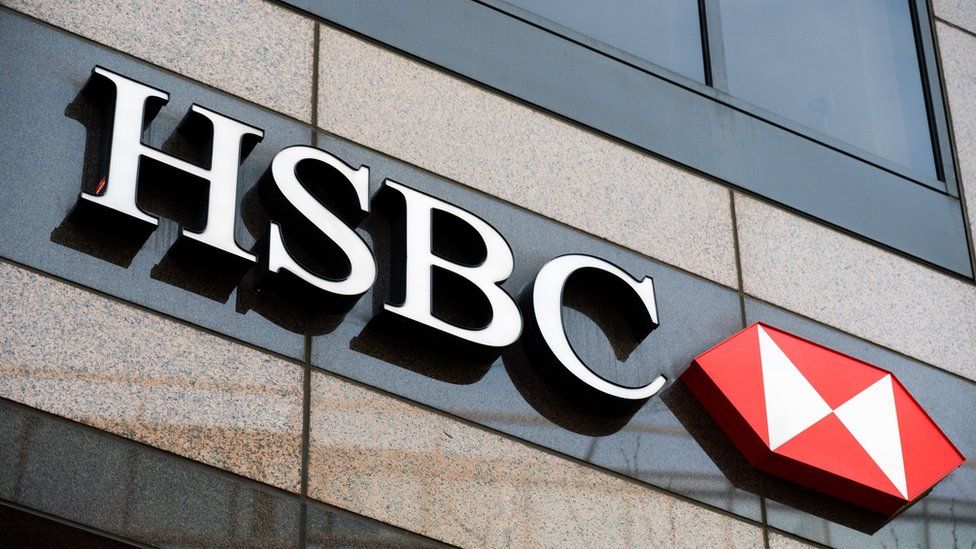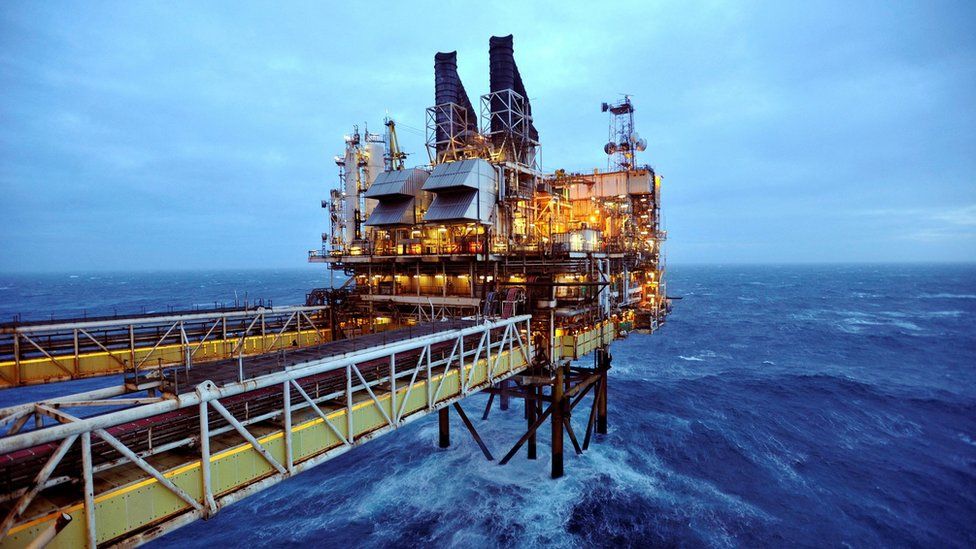HSBC updates climate policy to stop funding new oil and gas
By JENNIFER McDERMOTT - AP

The logo of the HSBC is seen on a building in Hong Kong, Nov. 16, 2021. Banking giant HSBC announced Wednesday, Dec. 14, 2022, it will no longer finance new oil and gas fields as part of its updated climate strategy. (AP Photo/Vincent Yu, File)
HSBC, Europe’s biggest bank, announced Wednesday it will no longer finance new oil and gas fields as part of its updated climate strategy.
Climate campaigners welcomed the moved saying HSBC provided a new baseline for other major banks but urged the bank to go further.
The bank said it would still provide financing to existing fossil fuel projects “in line with current and future declining global oil and gas demand.” It would also continue to provide finance and advisory services to energy sector clients but will assess the companies’ plans to transition to clean energy.
“It sets a new minimum level of ambition for all banks committed to net zero,” said Jeanne Martin from the campaign group ShareAction. But she added the change “doesn’t deal with the much larger proportion of finance it (HSBC) still provides to companies that have oil and gas expansion plans.” She called for new proposals to address the issue of corporate-level financing for energy companies “as soon as possible.”
Climate experts said the move was nevertheless a big deal.
“Banks make everything possible, including either the entrenchment of the status quo, that is infrastructure based on fossil fuels, or a transition that’s at the pace and of the kind that science tells us that is needed to address the crisis of climate change,” said Timmons Roberts, a professor at Brown University and director of the Climate Social Science Network. “So big banks making pledges like this are a big deal, a very big deal.”
Roberts said there are incentives to make these pledges, following through is the harder part.
“They’ll need to be vigilant at tracking whether they keep their promise,” he said.
Aditi Sen, climate and energy program director at the Rainforest Action Network, said that each year their research on fossil fuel funding shows banks headquartered in the U.S. are the biggest culprits when it comes to fueling the climate chaos, “yet their commitments are flimsy at best and deliberately negligent at worst.”
The group found that the largest four U.S. banks together account for one quarter of all fossil fuel financing identified over the last six years.
“Today HSBC has made a big step forward on climate, which proves that U.S. banks can step it up to do the same,” Sen added. “Financial institutions writ large play a really, really important role in keeping afloat the fossil fuel economy that we have, but also they have a huge role and an opportunity to drive the shift towards a clean energy economy.”
In a report last year the International Energy Agency said investments in new coal mines, oil and gas wells need to end immediately if the world stood a chance of meeting its commitment in the Paris Agreement of limiting global warming to 1.5 degrees Celsius (2.7 degrees Fahrenheit). Fossil fuel financing from the world’s 60 largest banks has reached $4.6 trillion U.S. dollars in the six years since the adoption of the agreement, with $742 billion in fossil fuel financing in 2021 alone, according to the most recent Rainforest Action Network report.
Earlier this year a group of institutional investors found that several banks — including HSBC — would need to significantly step up their efforts on climate if the Paris goal is to be met.
Bank policies must be reconciled with the climate upheavals and economic threats posed by those upheavals that the banking industry warns about, said U.S. Sen. Sheldon Whitehouse, a Rhode Island Democrat who is a leading advocate for strong action on climate.
“For a long time the banking industry has been talking out of two sides of its mouth. They’ve been offering these really grim warnings about the bursting of the carbon bubble and the collapse of coastal property values and all of that, while at the same time continuing to behave as if the things that they were saying weren’t true,” he said. “So this aligns HSBC policy with what the banking industry has been saying for a long time, and I think it’s welcome and overdue.”
___
Associated Press climate and environmental coverage receives support from several private foundations. See more about AP’s climate initiative here. The AP is solely responsible for all content.
HSBC to end funding for new oil and gas fields

ALEX TAI/SOPA IMAGES\GETTY IMAGES
By Esme Stallard
BBC News Climate and Science
HSBC has announced it will stop financing new oil and gas fields, as part of its efforts to drive down global greenhouse gas emissions.
Environment groups said the move sends "a strong signal" to fossil fuel giants that investment is waning.
Europe's largest bank said it made the decision after receiving advice from international energy experts.
It comes following previous criticism of HSBC for funding oil and gas projects despite its green pledges.
Jeanne Martin, head of the banking programme at ShareAction, a charity that campaigns for reducing investment for fossil fuels like oil and gas, said: "HSBC's announcement sends a strong signal to fossil fuel giants and governments that banks' appetite for financing new oil and gas fields is diminishing."
The charity called on other banks to follow suit - saying this move sets a "a new minimum level of ambition" for the sector.
In 2020, HSBC made a pledge to be "net zero" - which means not adding to greenhouse gases already in the atmosphere - and investing up to $1 trillion (£806bn) in clean energy.
However, the bank came under criticism earlier this year when it was revealed it had invested an estimated $8.7bn (£6.4bn) into new oil and gas in 2021, according to ShareAction.
In the update to its energy policy, the bank said the decision had been made "follow[ing] consultation with leading scientific and international bodies" who had estimated that current oil and gas fields would meet any demand in 2050 under a "net-zero" scenario.
Under the 2015 Paris Agreement, 197 countries agreed to try to keep temperature rises "well below" 1.5C to avoid the worst impacts of climate change.
Experts say that to achieve this, net zero must be reached by 2050.
What does net zero mean and how are countries doing?
HSBC follows Lloyds bank - Britain's biggest domestic bank - which announced a similar decision in October.
Tony Burdon, chief executive at climate finance campaign Make My Money Matter, said: "it's another nail in the coffin for fossil fuel expansion, and a massive signal to other UK banks that the game is up on new oil and gas."

BBC News Climate and Science
HSBC has announced it will stop financing new oil and gas fields, as part of its efforts to drive down global greenhouse gas emissions.
Environment groups said the move sends "a strong signal" to fossil fuel giants that investment is waning.
Europe's largest bank said it made the decision after receiving advice from international energy experts.
It comes following previous criticism of HSBC for funding oil and gas projects despite its green pledges.
Jeanne Martin, head of the banking programme at ShareAction, a charity that campaigns for reducing investment for fossil fuels like oil and gas, said: "HSBC's announcement sends a strong signal to fossil fuel giants and governments that banks' appetite for financing new oil and gas fields is diminishing."
The charity called on other banks to follow suit - saying this move sets a "a new minimum level of ambition" for the sector.
In 2020, HSBC made a pledge to be "net zero" - which means not adding to greenhouse gases already in the atmosphere - and investing up to $1 trillion (£806bn) in clean energy.
However, the bank came under criticism earlier this year when it was revealed it had invested an estimated $8.7bn (£6.4bn) into new oil and gas in 2021, according to ShareAction.
In the update to its energy policy, the bank said the decision had been made "follow[ing] consultation with leading scientific and international bodies" who had estimated that current oil and gas fields would meet any demand in 2050 under a "net-zero" scenario.
Under the 2015 Paris Agreement, 197 countries agreed to try to keep temperature rises "well below" 1.5C to avoid the worst impacts of climate change.
Experts say that to achieve this, net zero must be reached by 2050.
What does net zero mean and how are countries doing?
HSBC follows Lloyds bank - Britain's biggest domestic bank - which announced a similar decision in October.
Tony Burdon, chief executive at climate finance campaign Make My Money Matter, said: "it's another nail in the coffin for fossil fuel expansion, and a massive signal to other UK banks that the game is up on new oil and gas."

In October, the UK government announced a new round of North Sea oil and gas licences
It is not yet clear if this is the beginning of a trend across the sector, but it comes just months after the UK government announced a new round of licensing for oil and gas production in the North Sea.
It is not yet clear if this is the beginning of a trend across the sector, but it comes just months after the UK government announced a new round of licensing for oil and gas production in the North Sea.
New UK oil and gas licences defy climate warnings
HSBC has said it will continue to keep its investments already in oil and gas fields as it "recognises that fossil fuels, especially natural gas, have a role to play in the transition, even though that role will continue to diminish".
SEE

 FILE - In this photo taken by an individual not employed by the Associated Press and obtained by the AP outside Iran shows students at a protest over the death of Mahsa Amini, 22, in the custody of the country's morality police, in Tehran, Oct. 7, 2022.
FILE - In this photo taken by an individual not employed by the Associated Press and obtained by the AP outside Iran shows students at a protest over the death of Mahsa Amini, 22, in the custody of the country's morality police, in Tehran, Oct. 7, 2022.
















